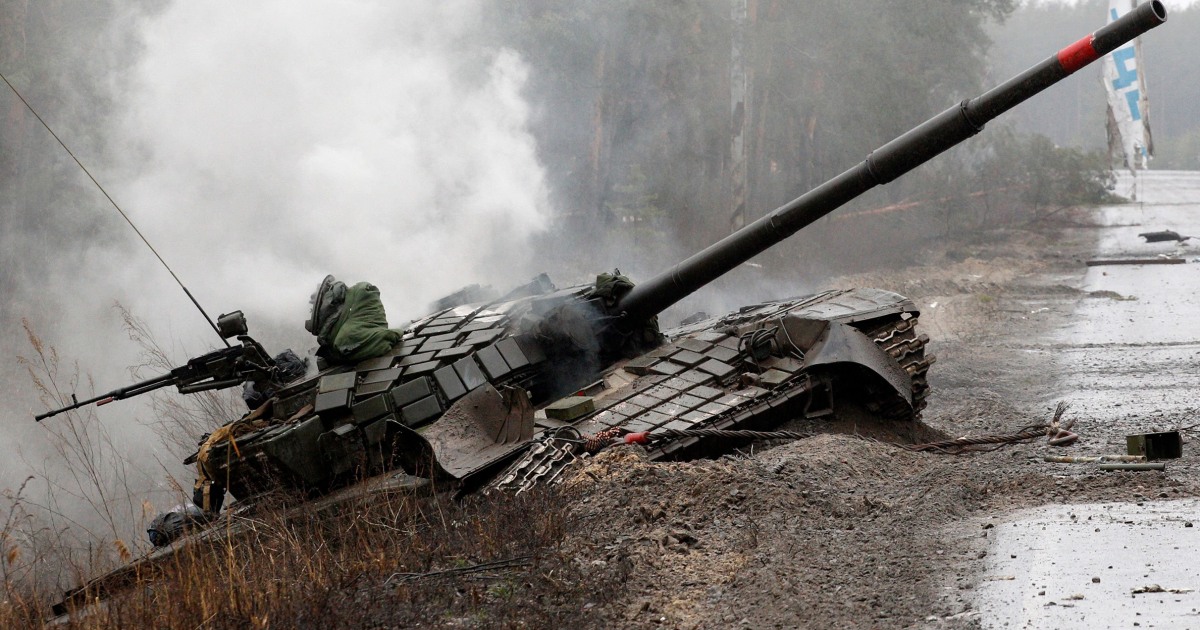
The lack of planning and a “just drive down the road and see what happens kind of approach,” has brought a lot of these challenges to light, Edmonds said.
“It appears that a mix-up in the logistics has inadvertently brought a lot of the conscripts to the front,” he said, calling Russia’s early strategy “a rush to failure.”
Other experts outside the U.S. agreed, expressing their surprise that this was not the well-oiled, well-organized machine that Western analysts had expected when observing how Russia had honed its armed forces over the last decade in Syria or at Ukraine’s border.
Instead, the world was seeing reports of young Russian conscripts captured en masse by Ukrainian forces without appearing to have been briefed by their officers, Keir Giles, the research director of the Conflict Studies Research Centre in London, said.
“The early stages of the campaign were reminiscent of the Russian army of almost 30 years ago,” Giles said. “There were dismal echoes of the isolated units that pushed into the center of Grozny in Chechnya, without knowing where they were going, what they were doing, or what was awaiting them and dying horribly as a result.”
Some mysteries remain as well.
It is unclear why Russia has not fully involved its air force, and Ukraine has been able to beat back their offensives from key targets with much weaker air power. It is also not fully known why Russia’s mileslong convoy northwest of Kyiv has come to a stop, though it appears Ukraine’s resistance may have played a role.
“They were able to hit some of those lead vehicles and get it to stop,” Pentagon press secretary John Kirby said on MSNBC.
That’s perhaps a major takeaway about Russia’s slow progress: Ukraine’s military is putting up a ferocious fight, as best it can, something Putin may not have expected.
Leonid Polyakov, Ukraine’s former vice minister of defense, was trained by the Soviet military. He said over the phone from Kyiv that Ukraine had regularly cycled its military units through the Donbas region in the country’s east, where they have fought Russian-backed separatists since 2014.
Its military, battle-hardened by the long-running conflict, had also received training from Western nations, including the U.S., the United Kingdom, Canada, Poland and Lithuania, he said.
“It may be surprising for some people, but it is not so for Ukrainians,” Polyakov said. “Ukrainian land forces exceed in terms of fighting ability the superior numbers of Russian troops.”
He also said that it appeared Russia had not paid attention to the weather, as they had gotten much of their war machinery stuck in thick Ukrainian mud that is typical at this time of year in the region’s black soil, which he called a “natural defense.”
“As Napoleon once said,” Polyakov added, “‘When your enemy makes mistakes, don’t try and stop them.'”
Next, he said, he hopes Ukraine will step up its information war.
That’s something the country already appears to be doing, with Ukrainian officials posting frequent updates on social media to rally the country’s public, gain global support and demand consequences for their invaders. They have also pointed to the apparent shortcomings of the forces they are battling to hold off.
Zelenskyy branded Russian soldiers “children who are being used” and Kyiv has broadcast its willingness to allow captured Russian soldiers to call home and tell their families what is happening in the conflict.
The country’s defense ministry posted a flyer on its Facebook on Tuesday that said, “Ukraine has made the decision to return POW to their mothers if they come to Ukraine.”
“We have to increase the effectiveness of our information warfare, our information impact on the Russian soldiers, especially officers and generals, because soldiers are 90 percent disoriented having no desire to come and die here,” Polyakov said.
While much has been made of Ukrainians’ scrappiness and agility to respond to this invasion, Polyakov and Western officials conceded that Russia’s overall military power and access to weapons, aircraft and equipment exceeds Ukraine’s.
Polyakov said he fears that Russians will move from cruise missiles, which they have relied on in recent days, to the less precise ballistic missiles as well as other indiscriminate weapons aimed at mass destruction. There will also likely be fewer conscripts and more of the better-trained volunteer military engaging in battles.
It’s a fear shared by Edmonds, Giles and Cancian among many other experts, and Western officials warned that Ukraine’s darkest days — large-scale destruction and a massive number of civilian casualties — lie ahead.
“Russian solutions to military problems are often more effective than they are elegant,” Giles said.
“The lack of compunction Russia will have once it fails to win the war in a clever way will mean it moves to winning by bludgeoning Ukrainian resistance into submission.”
Source: | This article originally belongs to Nbcnews.com










